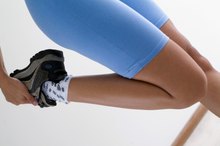Strain of the Pectoral Muscle
Your pectoral muscles are the large muscles in your chest, spanning from just below your collar bone down through your top six ribs. You use your pectoral muscles when you flex your shoulders and raise your arms over your head, such as when you apply underarm deodorant. A strain of the pectoral muscle is like any other muscle strain, and can be self-treated in many cases. Seek immediate medical help if your muscles swell significantly or if you have trouble breathing.
Causes
The primary cause of a pectoral strain, like most muscle strains, is overuse. Bodybuilders or those who participate in extensive strength training are more prone to this type of injury due to the heavy weights they lift on a regular basis. Exercising or weightlifting without warming up adequately can be another cause of a pectoral strain.
Symptoms
What to Do for a Sore Calf From Hiking
Learn More
Chest pain can be a sign that you've strained your pectorals. The front of your arm and shoulder may also hurt, especially if you have ruptured the pectoralis major tendon along with straining the muscles. You may have difficulty moving your arm when you've strained the pecs. A mild muscle strain or first-degree tear does not contribute to loss of muscle strength, but more serious second- and third-degree tears can cause significant muscle weakness and loss of function, according to Drugs.com.
- Chest pain can be a sign that you've strained your pectorals.
- The front of your arm and shoulder may also hurt, especially if you have ruptured the pectoralis major tendon along with straining the muscles.
Treatment
Home treatment for a pectoral muscle strain primarily involves rest — put a temporary hold on your workouts and allow the muscle to heal. Icing the area can reduce inflammation and control your pain. Sports Injury Clinic suggests resting and icing the strained muscle for two days, and applying compression bandages to your chest and torso area to further contain swelling. If you continue to experience pain, see your doctor. Severe muscle and tendon tears may require surgical intervention if self-care measures are not sufficient.
- Home treatment for a pectoral muscle strain primarily involves rest — put a temporary hold on your workouts and allow the muscle to heal.
- Sports Injury Clinic suggests resting and icing the strained muscle for two days, and applying compression bandages to your chest and torso area to further contain swelling.
Prevention
Stretching Exercises for ACL Injuries
Learn More
Stretching out your pectorals before working out can help prevent muscle strains. A chest stretch that you can do at home helps loosen up the muscles. Stand so that one side of your body rests next to a wall. Bend your elbow — the one that's closest to the wall — and place the lower part of your arm and hand flat on the wall. Take one step forward while keeping your arm on the wall, and turn your body so that you're facing away from your arm. Hold the position for up to 30 seconds; you'll feel the stretch in your pectorals.
- Stretching out your pectorals before working out can help prevent muscle strains.
- Take one step forward while keeping your arm on the wall, and turn your body so that you're facing away from your arm.
Related Articles
References
- Sports Injury Clinic: Pectoralis Major
- Sports Injury Clinic: Rupture of the Pectoralis Major Tendon
- Drugs.com: Muscle Strain Care Guide
- MedlinePlus: Muscle Strain Treatment
- Manske RC, Prohaska D. Pectoralis major tendon repair post surgical rehabilitation. N Am J Sports Phys Ther. 2007;2(1):22-33.
- Roddey, T. S., Olson, S. L., & Grant, S. E. (2002). The effect of pectoralis muscle stretching on the resting position of the scapula in persons with varying degrees of forward head/rounded shoulder posture. Journal of Manual & Manipulative Therapy, 10(3), 124-128.
Writer Bio
Erica Roth has been a writer since 2007. She is a member of the Society of Professional Journalists and was a college reference librarian for eight years. Roth earned a Bachelor of Arts in French literature from Brandeis University and Master of Library Science from Simmons College Graduate School of Library and Information Science. Her articles appear on various websites.







